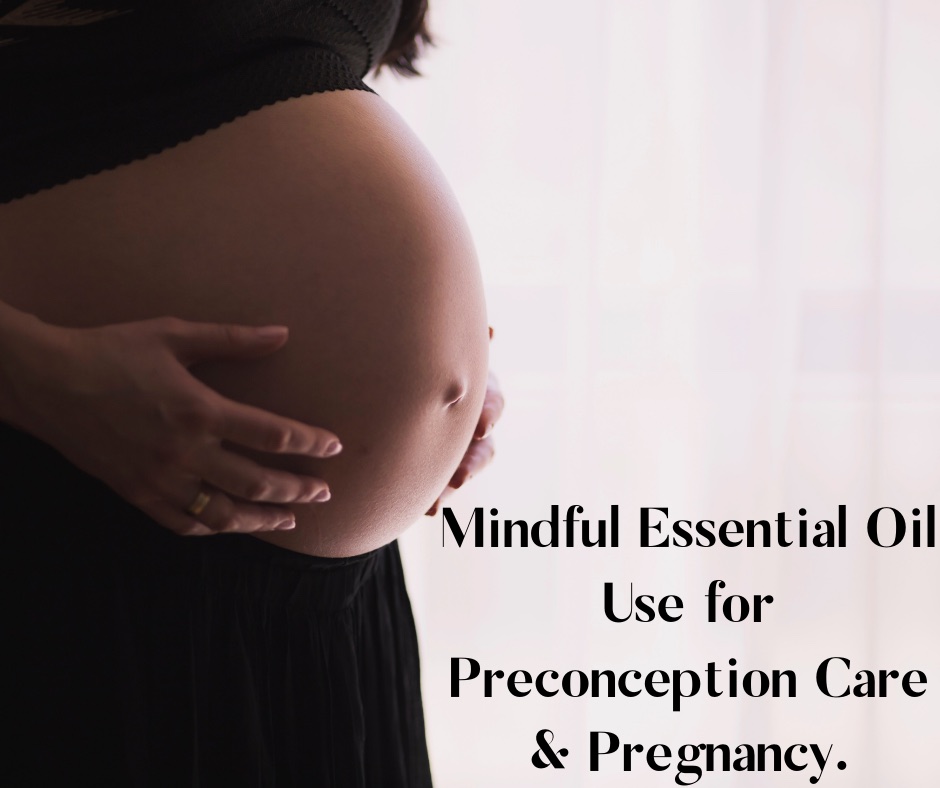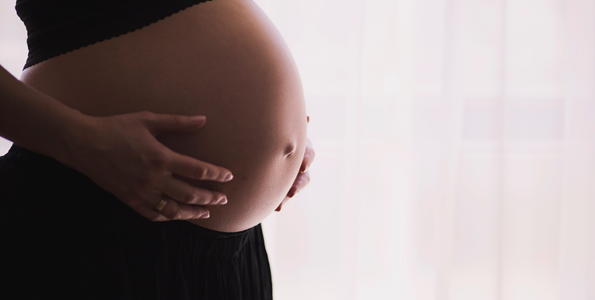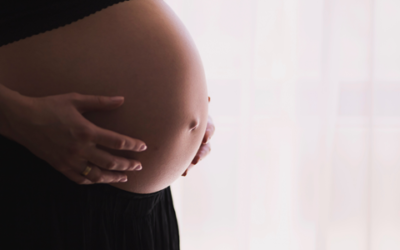
Here I am at 17 weeks pregnant and absolutely frothing that I finally feel like I can share more on the topic of essential oils and pregnancy.
You see I really haven’t felt qualified to share much on this topic….. what would I know because I’ve never been pregnant has been my train of thought. As such, I’ve always just deferred to the experienced mumma’s around me.
Not anymore. Achieving a successful pregnancy has been a 2 year journey complete with multiple miscarriages before arriving here, at this beautiful destination. Throughout this period I’ve been actively researching and clamoring to get my hands on as much information as possible as to where essential oils fit in the preconception and pregnancy worlds. I’ve questioned my own essential oil use more than I care to admit as will tend to happen after experiencing losses and with all this under my belt, I feel I have a useful opinion to offer for women.
I’m going to take you on a journey from Preconception cleansing support through to the Pregnancy period, but not postpartum. My focus is on helping people achieve a successful pregnancy.
Before I dive in, I want to preface this by saying that every woman’s quest to conception is different. For some it’s effortless and for others, full of frustration. I really feel that we need to take into consideration some of the common reasons for miscarriage to occur because it stretches far beyond an essential oil causing possible uterine contractions (which is not backed up by research at all I might add). Immune dysregulation between the fetal and maternal cells is common, autoimmunity can play a role in implantation, the stress of trying to conceive can completely throw a woman’s hormones out of whack making for an ‘unsafe’ environment for a fetus and on it goes. My thoughts on essential oils during pregnancy take some of these issues into account.
Preconception – The Journey Begins
The journey begins well in advance, at least 3- 6 months for those seriously committed to optimising the genetic potential of your future baby and also your own health during pregnancy.
For women, this period of preparation should center around detoxifying, purifying and supercharging your body to make it the most pristine and nourishing environment possible for an embryo. For men, this period is all about optimising the health of your sperm mitochondria and DNA. It takes between 90-120 days for both sperm and egg to mature. This means we have 90-120 days to create the healthiest most vital future potential.
Let’s Detox, restore DNA integrity and mitochondrial health…….
The thirty-day-cleanse.pdf is an ideal starting point for both for at least a 60-90 day period coupled with removing all alcohol, refined sugars, processed foods, recreational drugs, pharmaceuticals where possible, gluten, dairy and no more than 2 cups of coffee per day.
– Citrus Oils will support the elimination of toxic xenoestrogens from the body and upregulate our friend glutathione, the master antioxidant that safeguards against oxidative stress and cellular damage. glutathioneTopical and internal application are both powerful ways to support your body’s natural detoxification capabilities.
– Cilantro Essential Oil will support the release of heavy metals stored in tissues however it needs to be used in conjunction with binding agents such as activated charcoal, zeolites, apple pectin, fulvic/humic acid to ensure toxic agents are safely escorted from the body instead of being recirculated.
– Cinnamon Essential Oil has demonstrated some efficacy in improving sperm motility through it’s antioxidant capacities however I feel simply using DDR Prime is a better option given it is a formula designed specifically to combat oxidative stress.
– Zendocrine Oil Blend will support the release of toxicity from cells, hormone balance, liver and kidney function.
– Zendocrine Herbal Complex will safeguard the organs of elimination from damage, enhance toxin filtration capabilities and promote endocrine/ hormone balance. A healthy liver is imperative to producing healthy levels of thyroid hormone which is so very critical to a successful pregnancy.
– DDR Prime will support DNA integrity, assist in repairing DNA fragmentation,cellular renewal and promote healthy levels of inflammation. Oxidative Stress is strongly implicated in both male and female infertility as well as miscarriage, hence the importance of including plenty of antioxidant rich foods as well as those found in essential oils. DDR Prime is full to the brim of antioxidant abundant essential oils and is therefore a must have in the months of preparation.
– Mito2Max for men is a powerful support to improving mitochondrial health, circulation and cellular energy. This is sperm superfood! For women, L Carnitine has been found to optimise fertility and offers a protective effect on the oocyte. It safeguards against oxidative stress, supports hormone balance and enhances energy production. Alpha Lipolic Acid safeguards against oxidative stress which has negative implications on fertilisation, viability, implantation and overall fertility.
– Lifelong Vitality is a must to ensure baseline levels of vitamins and trace minerals for both healthy sperm and ovum. The XeOmega may be very supportive where blood coagulation issues are concerned given omega 3 fatty acids act as natural anti coagulation agents.
– Deep Blue Polyphenols are a wonderful addition for preconception care to combat oxidative stress. Resveratrol and Curcumin are strong botanical antioxidants that serve to protect the female reproductive structures as well as the oocyte against the harmful effects of free radical damage. Blood coagulation can also be implicated in a number of miscarriage factors. Again – curcumin may be a wonderful therapeutic to support proper blood production and coagulation.
– Terrazyme will support the integrity of the intestinal barrier, maximise absorption of nutrients from food, aid in the breakdown of scar tissue and support the immune system.
Hormonal Support…….
– Fir Tree Oils such as Siberian Fir, Black Spruce, Hinoki and Cypress will support cellular renewal, mitochondrial health whilst actively working to reduce signs of stress in the body and restore inflammatory balance during the preconception period.
– Frankincense will be a powerful ally to promote HPA Axis balance through the reduction of corticosteroids being released by the adrenal cortex.
– Floral Oils such as Rose, Neroli, Jasmine, Geranium, Clary Sage, Roman Chamomile and Lavender each afford our hormones a gentle nudge back to a state of re-calibration and harmony whilst actively reducing the physical and emotional signs of stress in the body. Between your floral and fir tree oils, these will be your daily go-to’s to support HPA and HPT Axis function and balance. (Hypothalamus, Pituitary, Adrenal/ Thyroid Axis). Rose is also a powerful activator for healthy cervical mucus. It has mucolytic properties that promote healthy vaginal secretions and cervical mucus which will support the travel of sperm through the cervix and allow them to swim freely and fast. Geranium has a gorgeous balancing effect on the endocrine system and harmonises perfectly with Clary Sage as a cleansing uterine tonic.
– Clary Calm we know contains Vitex which has long been used to support healthy progesterone levels whilst bringing estrogen levels into line by way of stimulating Luteinising Hormone. Clary Calm also contains many of our wonderful floral friends alongside Carrot Seed Oil which is renowned as a hormone tonic by way of its influence on the endocrine system, namely the thyroid and liver.
* There is some evidence suggesting that both Basil and Fennel may elicit hormone disruption by significantly increasing or altering hormone concentrations of estradiol, estrone, dehydroepiandrosterone (DHEA), androstenedione, progesterone, and estriol thus potentially disrupting the delicate hormone balance needed to sustain a healthy pregnancy. Fennel contains Anethole which has showed an anti-implantation effect in pregnant rats in various studies. I have chosen to exclude both oils entirely through preconception until the third trimester.
{ I am personally not a fan of using any soy derived products particularly where autoimmunity is concerned. I also feel that conducting a DUTCH Hormone Test to determine ones actual hormone balance would be wise before introducing a supplement that may interfere unnecessarily, hence why I haven’t suggested the Phytoestrogen Complex }

Now let’s chat about immune system mediated pregnancy loss or failure to implant.
Where repeated miscarriage is concerned, investigating the role of the immune system and natural killer cells may be warranted.
Natural killer (NK) cells are an important subgroup of lymphocytes (a subgroup of white blood cells) which have a large variety of functions, from killing cancer cells to, potentially, also killing the “invading” (i.e., implanting) embryo if the immune system sees the embryo as “foreign.”
Because half of the embryo is paternal, it is not surprising that a maternal immune system would see an implanting embryo as “foreign” – as it would see an organ transplant from the partner – and attack it. Yet, if a woman has a normally functioning immune system, such an attack does not happen because her immune system, in response to messages from the embryo, reprograms itself from rejection to tolerance of the embryo. Women who have hyper-active immune systems due to autoimmunity, inflammation or even from being very hyper-allergenic, do not reprogram their immune systems appropriately. As a consequence, their immune systems still view embryos as “foreign,” attack them, thereby causing implantation failure and/or pregnancy loss.
Our beautiful Fir Tree Oils such as Hinoki, Siberian Fir and Cypress may be contraindicated when it comes to this issue given they have been found by numerous studies to up-regulate natural killer cell activity. This is great when it comes to their anti-tumorigenic properties, but not so ideal when it comes to allowing an embryo to implant safely. It’s something to keep in mind. What we are trying to do is create a supremely stable and calm immune system that does not react inappropriately to perceived foreign DNA.
Black Spruce may not fit in this same category given it has demonstrated some ability to support a healthy implantation and relationship between the maternal and fetal cells when combined with Quercetin (an antioxidant) which is present in the Alpha CRS, Mito2Max and Deep Blue Polyphenol Complex.
Same goes for our more heavy hitting essential oils that are abundant with phenolic compounds such as Oregano, Thyme, Cinnamon, Cassia and Clove. These oils and their constituents such as carvacrol and eugenol, have demonstrated the ability to be cytotoxic to embryo’s with detrimental effects to cell nuclei and an increased rate of cell death. They also have a very long half life of around 9-10 hours, meaning those essential oil compounds stay in circulation for that long in the body until metabolised and excreted. Given that we want cells to multiple rapidly and healthfully, this makes me incredibly wary.
If we think about an embryo as a ‘foreign invader’, avoiding the use of these oils and others that stimulate the immune system makes perfect sense in my mind given their potent antimicrobial properties. I’ve heard people state that essential oils act independantly of the immune system on multiple occasions however I don’t believe this to be true. Given that research demonstrates a very direct effect on immune system cells such as Natural Killer Cells and Lymphocytes, this makes it abundantly clear that essential oils do indeed act on and influence immune system function. As such I have diligently chosen to avoid them till now and will continue to do so with the exception of using in my DIY cleaning products.
Other oils that significantly strengthen the response of the immune system include Niaouli which features in DDR Prime and Aniseed/ Star Anise which feature in DigestZen. Obviously we have Cinnamon and Clove in On Guard and Cinnamon also features in Passion and Smart n Sassy. These oils are fine to use in preconception however would be wise to exclude once conceived. Again, I’ve chosen to exclude these oils until the third trimester.
Remember that implantation is such an important, if not THE most critical time for a pregnancy and we need the immune system to switch DOWN…..not up. We do not want to interfere with the delicate balance that is needed for that little blastocyst embryo to burrow deep into our uterine tissue. Now is not the time to stimulate, strengthen or provoke, it is a time for stability, quiet and calm.
To anchor a hyper-vigilant immune system oils such as Spikenard and Vetiver may be incredibly supportive as they draw energy down and temper an excessive immune response which is so helpful in calming autoimmune related distress.

We’ve Arrived at Pregnancy……..
Congratulations, you’ve successfully had a little embryo implant, now it’s time to help it settle in and support our body in doing its most beautiful thing.
During this period of time you will often hear claims that women during pregnancy shouldn’t use the likes of Jasmine, Clary Sage Rose, Neroli or Geranium for fear of causing early uterine contractions which may lead to potential miscarriage.
I tend to side with Robert Tisserand’s views on this which are – “Almost all of the alleged emmenagogic or uterine stimulant essential oils either do not have such an effect (there is often no basis for these claims) or if they do, it is not powerful enough to cause miscarriage” (Tisserand and Young (2014) p. 160).
I would still err on the side of caution when it comes to Clary Sage given it does contain sclareol which is a natural phytoestrogen at around 1% which possibly exerts a weak estrogenic activity. Clary sage oil is not an estrogen mimic as Robert Tisserand states, though it quite probably does bind with estrogen receptor sites. In doing so, it could block activity from the body’s own estrogens, the net result of which would be a reduction in estrogenic action.
With Jasmine, Rose and Neroli however I feel quite comfortable using them and my musings go something like this……..
We know that essential oils are intelligent compounds from nature to be used for nature, which is us. We also know that floral essential oils have a beautiful affinity for gently calibrating the female reproductive system. I cannot help but think it would go against the very nature of a floral essential oil such as Rose to disrupt the hormonal balance or uterine environment required for a healthy pregnancy.
I see these potent floral petals as exquisite allies to help nurture and guide us through the most magnificent physical journey with a sense of ease, balance, grace and great calm.
Does that resonate with you?
Essential oils that contain high levels of constituents such as citral, geranial and neral which are found in the likes of Lemongrass, Melissa, Lemon Myrtle, Litsea, and Petitgrain generally are considered to exhibit embryo-fetotoxicity such as growth retardation, skeletal abnormalities and implantation errors. They may also interfere with estrogen regulation though at very high doses. Avoiding the use of these oils internally and minimizing topical application would be prudent based upon the numerous studies available demonstrating this activity. In most cases large doses were given internally/ intramuscular or subjects were exposed aromatically for six hours straight which I doubt anyone would do on an ordinary basis.
Myrrh is another essential oil with a question mark and is cautioned for use during pregnancy due to it’s strong anti-angiogenic (inhibit blood vessel formation and growth) properties. These properties are fabulous when it comes to dealing with rouge/ diseased or mutating cells however not so fabulous when it comes to supporting the growth of an embryo. Don’t overdo the topical application would be my suggestion and definitely do not ingest.
YarrowPom we know is incredible for skin health, particularly when it is being stretched in all directions BUT – although doTerra’s Yarrow is safe from the perspective it does not contain Thuja as most Yarrow’s do (Thuja being highly contraindicated for pregnancy), it still initiates a powerful cleanse and purge effect. Cleansing and purging be it emotional or physical especially during the first trimester is definitely not something we want to provoke! Toxic emotions can imprint on the new little soul taking life inside of you and physical cleansing may in turn flood a little fetus with unwanted compounds. I really do feel that YarrowPom is best left well alone until the third trimester despite other recommendations.

Safe Application.
It’s funny, I kinda think that everyone is expecting me to be all on board for ingesting oils during pregnancy but it’s quite the opposite.
“One should be very cautious with oral administration because it is highly likely that essential oil molecules cross the placenta to the fetus due to their due low molecular weight, protein binding ability. Components that cross the placenta are more likely to affect the fetal central nervous system. Knowing this, it is recommended to limit oral consumption of essential oils to a dosage range of 10 to 25 percent of the standard adult dose” says Dr Scott A Johnson. If in doubt, just go without.
I feel that this is sage advice to follow for at least the first and second trimester. A developing fetus is exceptionally sensitive to any new perceived toxins in the body and detoxing at all during pregnancy is absolutely not recommended. Knowing that our essential oils such as citrus can precipitate the release of stored xenoestrogens from our tissues to give an example, is it really a good idea to ingest them early on?
I do not want to stimulate the release of any stored toxicity in my body whilst pregnant for concern that my baby being downstream, will receive a healthy dose of it. I also want to minimise the stress on baby’s developing organs of having to deal with constituents it may not be ready to receive.
I am much more comfortable with simple topical and aromatic application.
We know that with internal use 100% of the essential oil will enter the body VS under 10% with topical application. Robert Tisserand states – “Essential oils by their very nature, being organic substances, will cross the placental barrier and have the potential to affect the foetus. However, the amount of essential oil that actually accessed the mother’s skin is very tiny and therefore the amount that reaches the placenta is minuscule if proper dilutions are being used.”
Where an oil has been mentioned above as indicated for potential questionable activity, my suggestion would be to avoid, minimise or stick to aromatic application.
There are so many beautiful ways in which we can incorporate essential oils topically and aromatically during those early months of pregnancy. I certainly don’t feel like I’m missing out.
I hope this post has been helpful to anyone out there reading who is on their own fertility and healthy conception journey.
I wish you the very best and please do reach out if you have any questions at all or you would like my support with getting started with the worlds best essential oils.
x Bec






0 Comments